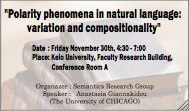2007年11月30日: Anastasia Giannakidou, Variation and compositionality in polarity items: why scalarity is not enough
[日本語 | English]
- とき:
- 2007年11月30日(金曜日)4:30pm
- ところ:
-
慶應義塾大学 三田キャンパス 研究室棟1階A会議室
- 講演者:
- Anastasia Giannakidou (University of Chicago)
- タイトル:
- Variation and compositionality in polarity items: why scalarity is not enough
- 概要:
-
In this talk, I discuss two distributional patterns of
negative polarity items (NPIs): those that are licensed
strictly by negation, and those that appear in a broader
variety of nonveridical contexts, including questions,
propositional attitudes, and modal verbs. I then consider two
theories of polarity, and see how they can deal with the
variation at hand: the scalarity approach (originating in
Kadmon and Landman 1993, and pursued in various forms by
Krifka, Lahiri, and Chierchia), and the variation approach
(Giannakidou 1998, 2001, to appear), which posits that,
alongside scalar NPIs, an additional source of polarity comes
from a dependent variable. A dependent variable is one that
cannot be interpreted deictically (i.e. cannot be interpreted
as a free variable), and some expressions become NPIs because
they contain such variables. The scalar approach assumes a
unitary lexical source for NPIs—widening plus some sort of
EVEN-scalarity— and cannot capture the variation in meaning
(scalar and not scalar) or distribution attested in (negative)
polarity. Another problem with scalarity is that does not
predict the correct status for ill-formed NPIs: it predicts
weaker effects (contradictions, presupposition failures) than
is actually the case. The variation approach, on the other
hand, by allowing more lexical sources, is more consistent
with the empirical and interpretational diversity of NPIs,
thus giving a more secure foundation for addressing
compositionality and predicating the correct status of PIs.
意味論研究会
グローバルCOEプログラム「論理と感性の先端的教育研究拠点」(慶應義塾大学)共催

Last modified: 2007-11-22 13:20:55 JST
